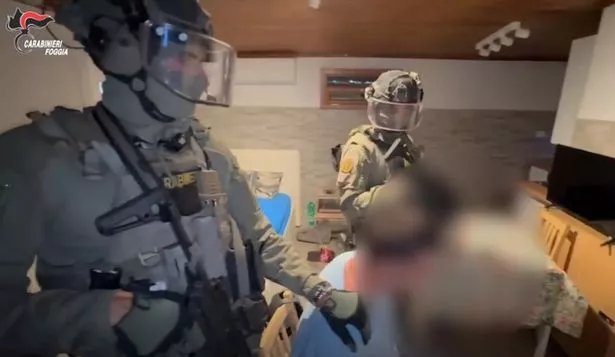Italian Police Capture Notorious Mafia Leader in Daring Dawn Raid
In a significant blow to organized crime in Italy, authorities have apprehended Leonardo Gesualdo, a 39-year-old mafia boss linked to one of the country’s most violent crime syndicates. The arrest took place early this morning in a meticulously planned operation by the Italian Carabinieri, who stormed his residence on the outskirts of Foggia, a city notorious for its mafia activity.
A High-Profile Arrest
Gesualdo, who had been on the run since 2020, was considered one of Italy’s most dangerous fugitives. He is the head of the Foggia Society, a mafia organization infamous for its brutal tactics, including a staggering rate of violent crime in the region. Reports indicate that the group is involved in an alarming frequency of criminal activities, including an average of one murder per week, daily robberies, and extortion attempts every two days. Local media have reported that Gesualdo was tried in absentia and sentenced to 12 years for mafia association.
The Carabinieri’s operation was executed with precision. Officers reportedly “caught him by surprise,” and he surrendered without resistance. During the arrest, authorities discovered a pistol with an erased serial number in his possession, further underscoring the serious nature of his criminal activities.
The Foggia Society: A Legacy of Violence
The Foggia Society, also known as the “Foggiani,” has a long and bloody history within Italy’s organized crime landscape. Emerging in the late 20th century, the group has been involved in various illicit activities, including drug trafficking, extortion, and murder. Its reputation for violence has made it one of the most feared crime syndicates in Italy, often compared to the more widely known Sicilian Mafia, Cosa Nostra.
Historically, the Foggia Society has been characterized by its brutal enforcement of loyalty and silence among its members, adhering to the code of omertà, which forbids cooperation with law enforcement. This code has been a cornerstone of mafia culture, but recent trends suggest a troubling shift. Reports indicate that younger recruits are increasingly willing to betray their organizations, a development that has left older mafia figures lamenting the decline of traditional values.
A Glimpse into Mafia Life
In a related incident earlier this year, wiretaps revealed that Sicilian mafia bosses were expressing dissatisfaction with the new generation of recruits. Giancarlo Romano, a prominent figure in Palermo’s mafia scene, was overheard complaining about the lack of loyalty among younger members. He nostalgically referenced the iconic film “The Godfather,” lamenting that the current crop of criminals lacks the connections and influence that characterized earlier mafia leaders.
Romano’s comments reflect a broader sentiment among organized crime figures who feel that their power has waned in the face of modern law enforcement techniques and societal changes. “We used to be number one, now it’s others,” he stated, highlighting the challenges faced by contemporary mafia organizations.
The Role of Law Enforcement
The arrest of Gesualdo is part of a broader strategy by Italian authorities to dismantle organized crime networks. The Carabinieri, along with other law enforcement agencies, have intensified their efforts to combat mafia activities, employing advanced surveillance techniques and intelligence-sharing initiatives. This approach has led to a series of successful operations against high-profile mafia figures, signaling a renewed commitment to eradicating organized crime from Italian society.
In recent years, Italy has witnessed a series of high-stakes raids that have resulted in the capture of numerous mafia leaders. These operations not only disrupt criminal enterprises but also serve as a deterrent to potential recruits who may be considering a life of crime.
Conclusion
The arrest of Leonardo Gesualdo marks a pivotal moment in Italy’s ongoing battle against organized crime. As law enforcement agencies continue to adapt and evolve their strategies, the future of mafia organizations like the Foggia Society remains uncertain. With increasing cooperation among international law enforcement and a growing societal rejection of mafia culture, the days of unchecked criminal activity may be numbered. The recent developments serve as a reminder that while the allure of organized crime may persist, the consequences of such a lifestyle are becoming increasingly severe.










